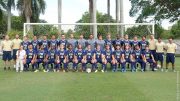Camila Fernandez/Assistant News Director
Throughout the summer, University psychology students and faculty help change the lives of preschoolers with behavioral problems, and their families, at camp.
It is a therapeutic and summer readiness treatment program for pre-kindergarteners lead by the Center for Children and Families of the College of Arts and Sciences.
It runs from July 16 till August 8 during the weekdays from 7:30 AM to 5:30 PM, with activities that include social-emotional skill building, sport games, and standard school subjects such as reading and math.
Families come in seeking clinical attention because their child is being expelled from preschool, said Katie Hart, co-director of the Summer Treatment Program for Pre-Kindergarteners.
She said the program sets out to help these children have a smoother transition from preschool to kindergarten.
“Our motivation comes from a real desire to help these families make that transition, one that’s positive,” said Hart. “Because we know that learning and going to school is so important for future success.”
The program is intended for preschoolers, between 4 and 5 years old, identified as being at High-Risk for Behavioral Disorders.
Through out the summer, they are evaluated for ADHD (Attention deficit hyperactivity disorder), disruptive behaviors, and learning problems.
It is based at Paul W. Bell Middle School in a summer day camp setting where students from FIU and out-of-state universities are trained to be clinical staff members.
According to Hart, these students are interested in school psychology, speech pathology, nursing, public health, and education, for example.
They are supervised by licensed professionals for feedback on their performance – how they’re working with the children and how to be able to build a relationship.
“I know we’re helping the families in the long-run, and [the children] with school,” said Diana Madruga, a senior psychology major.
“It’s so much more that we’re helping than besides just their behavioral problems.”
FIU alumna Lina Garces said she also knows that the children experience different situations in their lives and that it is difficult for them to adapt and to meet with their daily goals and requirements.
“I have this thing for kids, but as I said, it’s really motivating to see them change,” said Garces.
“In that moment when you say something, or when they actually get out of time out, you see that something changed.”
According to the Diagnostic and Statistical Manual of Mental Disorders, about 1 in 20 children across the country have ADHD symptoms. Many of them will continue to show these symptoms into adulthood, such as lack of attention.
Co-director of the Summer Treatment Program for Pre-Kindergarteners, Paulo Graziano, said that the children are already not looking forward to school and cannot get out of their comfort zone.
He said that is a negative trajectory down the line and so intervening at an early age is most effective for change.
“Intervening early is really our passion because that’s when you can make the most difference,” said Graziano.
According to Hart, most of the parents come ready to get help as a way to gain successful strategies to help their child. Through daily reports and parent meetings, the program has been able to build confidence with parents.
Also, no medications are used on the children. This is because the program does not want to use pharmaceutical treatment at a very early age.
“Parents are the child’s first teacher,” Hart said. “We want to give [them] all the skills that they need to be successful.”
“So that after the camp is over, [the children] can continue everything that they learned here in camp and bring it to school and home.”
Graziano said the program receives hundreds of applicants, but because of lack of resource in funds, there is a very limited space for admission.
This summer, the program reviewed more than 200 applicants, but only 60 slots were available.
He said the amount of slots available for children vary on how much money they are able to receive from the Children’s Trust and other grants.
Nevertheless, Graziano said that FIU’s location is significant for the program because it can provide a more extensive aid to Latino families who, according to him, are notoriously understudied.
“That allows an even better experience for parents that are getting feedback everyday on their child’s performance – to be able to communicate in whatever language.”
Hart said they continue monitoring their progress over time as they enter kindergarten and first grade.
“Once in a while, they’ll call us three years later to say, ‘Oh, we’re doing great; Student of the Month Award!’” said Graziano.
“It keeps us going on our 12-hour days,” he said.
-news@fiusm.com






I love this idea! Intervention for ADHD at this age is crucial and will be more helpful to these children to formulate coping mechanisms and helpful strategies early. Bravo!
Penny Williams
Author of “Boy Without Instructions: Surviving the Learning Curve of Parenting a Child with ADHD”
http://BoyWithoutInstructions.com